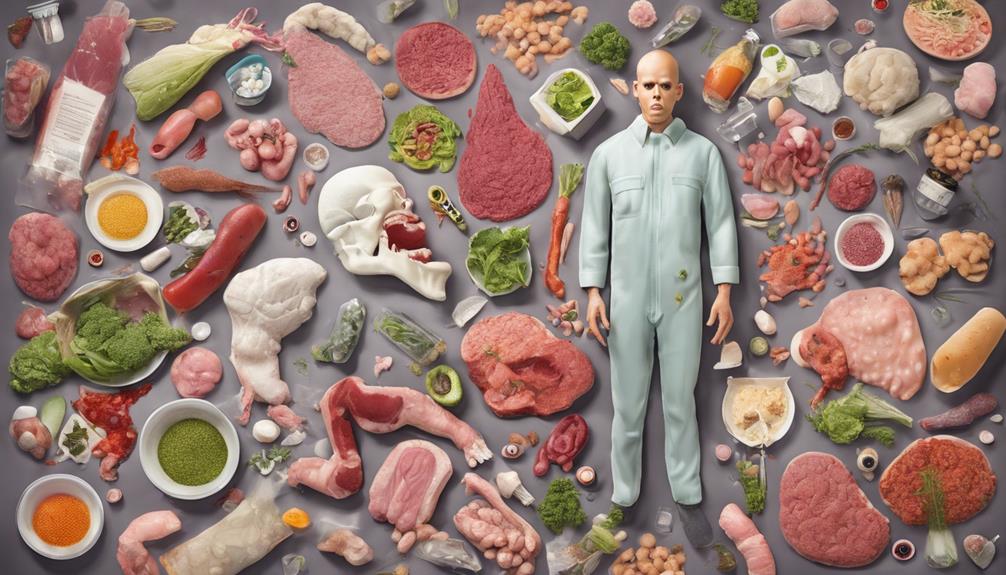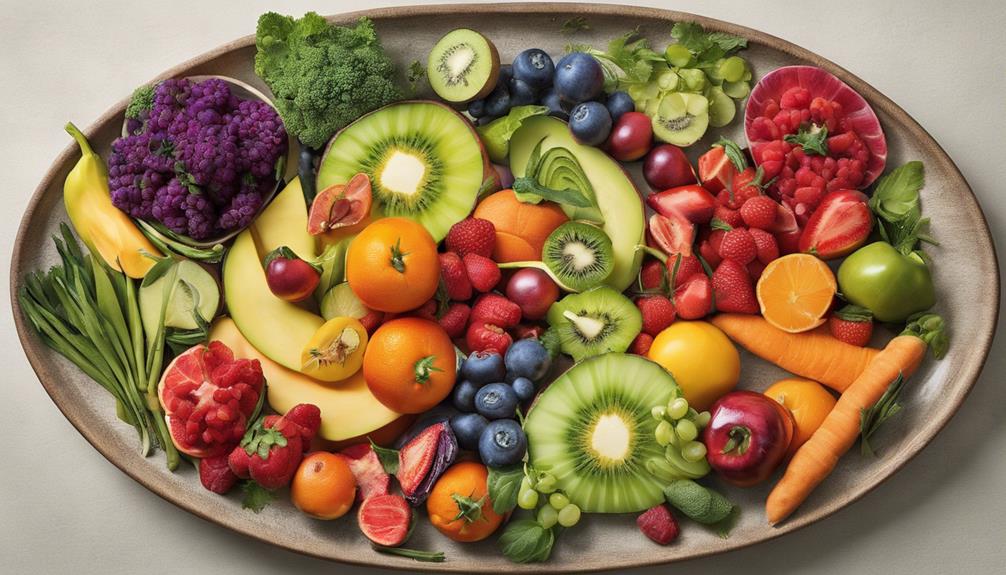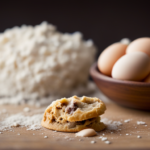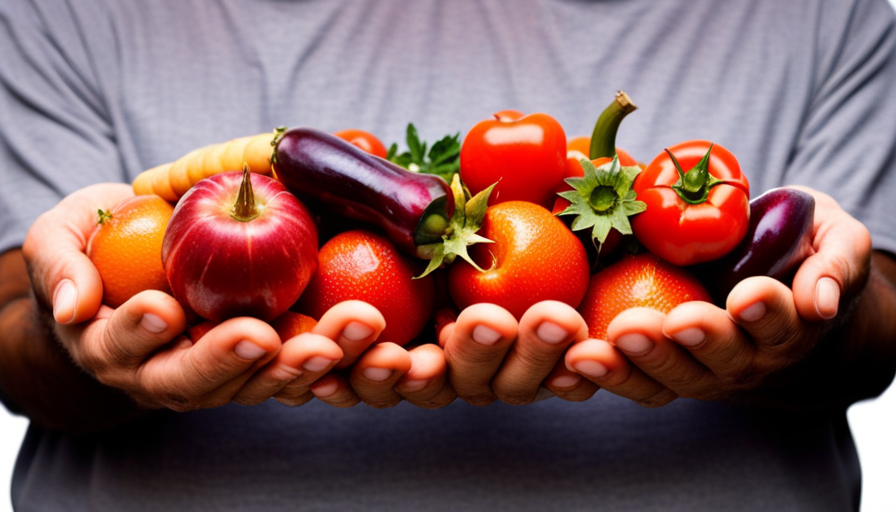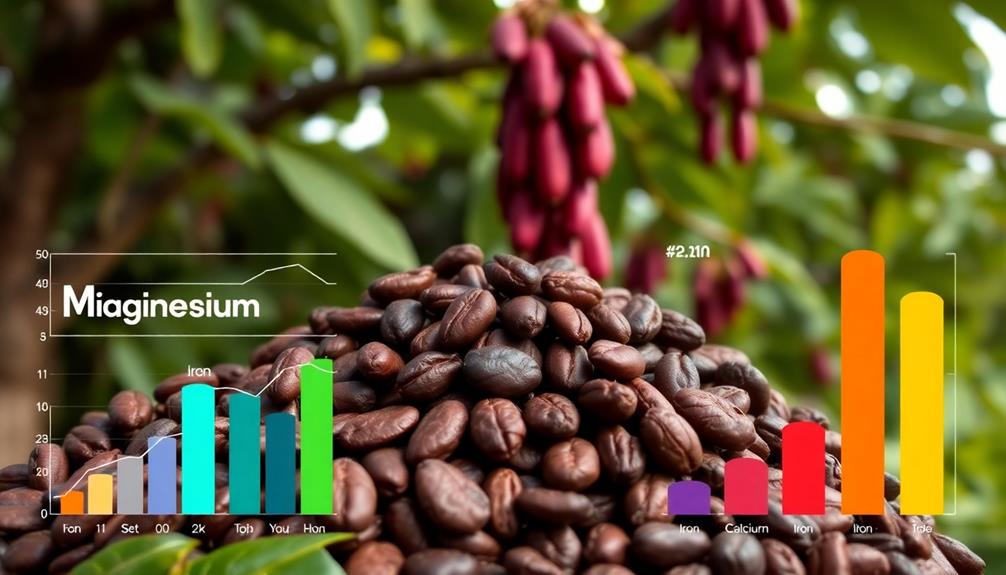Failure to heed warnings about consuming raw food can result in serious health repercussions. Lack of essential nutrients, potential bacterial contamination, risks to bone health, dangers of excessive supplementation, and heightened susceptibility to foodborne illnesses and parasites are significant threats. These dangers underscore the necessity of staying informed and adhering to recommended guidelines in order to protect against potential harm. With an awareness of these risks, individuals can make informed decisions for themselves and their pets.
Key Takeaways
- Risk of bacterial contamination like E. coli and Salmonella
- Increased likelihood of foodborne illnesses
- Potential exposure to tapeworms from raw meat
- Higher chances of nutrient imbalances and deficiencies
- Greater risk of bone-related injuries and gastrointestinal blockages
Nutritional Imbalances in Raw Diets
When feeding dogs a raw diet, it's important to be aware of potential nutritional imbalances that can arise. Raw diets, while popular among some pet owners, may lack essential nutrients necessary for a dog's health. A balanced diet for dogs requires a combination of proteins, fats, vitamins, and minerals that are often deficient in raw food regimens. Without these essential nutrients, dogs can suffer from nutritional deficiencies that can impact their overall well-being.
Ensuring that your dog receives a well-balanced diet is vital to prevent these nutritional imbalances. Without a proper mix of nutrients, dogs may not be getting all the essential elements needed for peak health. Nutritional deficiencies can lead to a variety of health issues, highlighting the importance of providing a well-rounded diet for your furry companion. By addressing these concerns and focusing on the necessary nutrients in your dog's raw diet, you can help mitigate the risks associated with potential imbalances.
Hygiene Risks From Handling Raw Meat
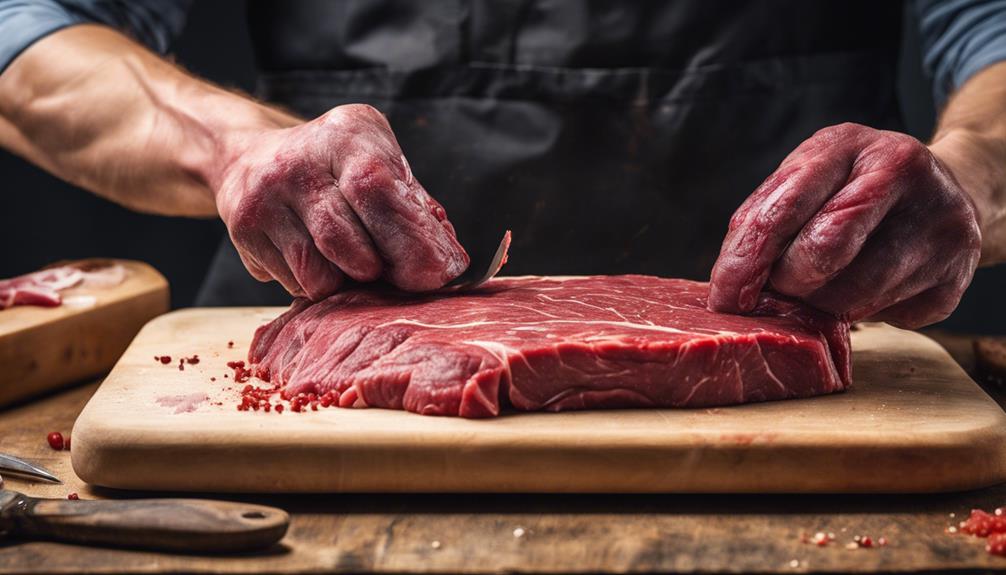
To minimize the risk of hygiene hazards associated with handling raw meat, it is essential to adhere to proper food safety practices diligently. Bacterial contamination and cross-contamination are significant concerns when dealing with raw meat. Ensuring that kitchen utensils are adequately cleaned after contact with raw meat is critical in preventing the spread of harmful bacteria to other foods or surfaces. Proper handling and storage practices play an important role in reducing the risk of foodborne illnesses related to raw meat consumption. Hygiene issues stemming from raw meat mishandling can lead to severe health hazards if safe food handling protocols are not followed. Observing food safety guidelines is paramount to mitigate the hygiene risks associated with raw meat.
| Hygiene Risks From Handling Raw Meat | ||
|---|---|---|
| Bacterial Contamination | Cross-Contamination | Food Safety |
| Proper Cleaning of Utensils | Storage and Handling | Prevention of Illness |
Issues With Bone Consumption
Consuming bones poses significant risks, including dental fractures, oral injuries, and gastrointestinal blockages in pets. Here are some key points to take into account about bone consumption:
- Bone Splinters: When pets ingest bones, splintering can occur, leading to sharp fragments that may cause lacerations in the mouth, throat, and digestive tract.
- Gastrointestinal Blockages: Bone fragments, especially from cooked bones, can create blockages in the intestines, causing pain, discomfort, and potential life-threatening situations.
- Cooked Bones: Cooking bones makes them more brittle and prone to splintering, increasing the risk of internal injuries when consumed by pets.
- Proper Bone Choices: It's vital to select raw bones that are suitable in size and type for your pet to minimize choking hazards and prevent digestive complications.
Veterinarians emphasize the dangers associated with bone consumption in pets, advising against giving bones due to the high likelihood of injury and obstruction outweighing any perceived benefits.
Over-supplementation of Vitamins and Minerals
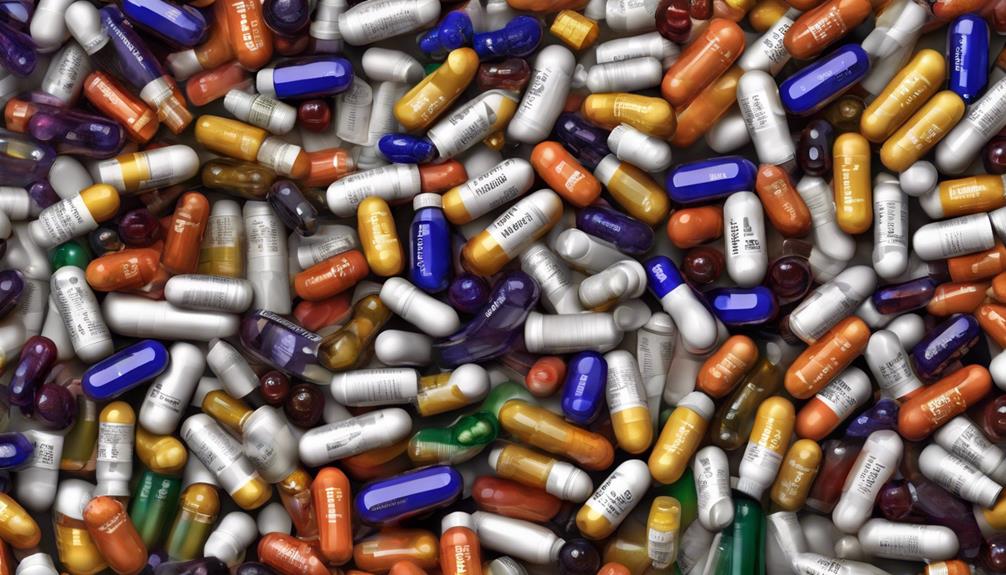
Excessive supplementation of vitamins and minerals in raw food diets can pose serious health risks for pets. When it comes to providing our furry friends with a balanced diet, it's important to understand the potential dangers of over-supplementation. Adding too many vitamins or minerals to their meals can lead to nutrient imbalances, causing toxicity and various health issues. Without proper regulation, pets may experience imbalances in essential nutrients like calcium, phosphorus, or vitamin D, which are essential for their well-being. To highlight the risks associated with over-supplementation, let's take a closer look at the potential consequences:
| Potential Risks of Over-Supplementation |
|---|
| Nutrient imbalances |
| Toxicity |
| Adverse health effects |
| Lack of essential nutrients |
| Harm to overall health and well-being |
It's important to consult with a veterinarian to make sure that any added vitamins and minerals are carefully monitored and moderated in your pet's raw food diet to prevent these risks and promote their health and longevity.
Bacterial Pathogens Like E. Coli and Salmonella
Ignoring raw food warnings can lead to exposure to dangerous bacterial pathogens like E. coli and Salmonella, commonly found in raw meats. These pathogens can cause severe food poisoning in both pets and humans, with a CDC study linking raw pet foods to a Salmonella outbreak affecting 150 individuals.
It's important to understand the risks associated with bacterial contamination, the potential for foodborne illnesses, and the serious health consequences these pathogens can pose.
Bacterial Contamination Risks
Highlighting the risks of bacterial contamination, pathogens like E. coli and Salmonella pose serious health threats when consuming raw foods.
- Consuming raw foods contaminated with E. coli or Salmonella can lead to severe food poisoning risks, causing symptoms like nausea, vomiting, diarrhea, and abdominal pain.
- Salmonella outbreaks linked to raw pet foods have resulted in increased hospitalization rates for both pets and their human family members, emphasizing the potential dangers of bacterial contamination.
- People and pets with weakened immune systems are at a higher risk of falling ill from consuming raw foods contaminated with pathogens like E. coli and Salmonella.
- Ignoring the warnings about bacterial contamination risks associated with raw foods can result in cross-contamination, spreading harmful bacteria to other foods and surfaces, further escalating health risks.
Foodborne Illness Potential
Raw food consumption poses a significant risk of foodborne illness due to the presence of bacterial pathogens like E. coli and Salmonella. These pathogens are commonly found in raw diets and can cause severe health complications if ingested. Ignoring the warnings about these risks can lead to food poisoning and other serious illnesses. To highlight the dangers associated with bacterial contamination in raw food, consider the following table:
| Bacterial Pathogen | Health Risks |
|---|---|
| Salmonella | Severe gastroenteritis and fever |
| E. coli | Abdominal cramps and bloody diarrhea |
| Listeria | Meningitis and miscarriage risk |
Being aware of these potential dangers is essential for maintaining the health and well-being of both pets and humans who consume raw food.
Health Consequences of Pathogens
Bacterial pathogens like E. coli and Salmonella present significant health risks when consumed through raw food, leading to severe food poisoning in both dogs and humans. Here are some important points to keep in mind:
- Pathogens in Raw Food: These harmful bacteria can cause serious illnesses, including vomiting, diarrhea, abdominal pain, and in severe cases, hospitalization.
- Cross-Contamination Concerns: Improper handling of raw food can lead to the spread of pathogens to other surfaces, utensils, and foods in the kitchen.
- Increased Risks for Vulnerable Individuals: Children, the elderly, and individuals with weakened immune systems are particularly susceptible to the health consequences of consuming contaminated raw food.
- Prevention Through Proper Hygiene: Following strict hygiene practices, such as washing hands and surfaces thoroughly, is essential in preventing food poisoning from bacterial pathogens.
Risks of Endoparasites Such as Tapeworms
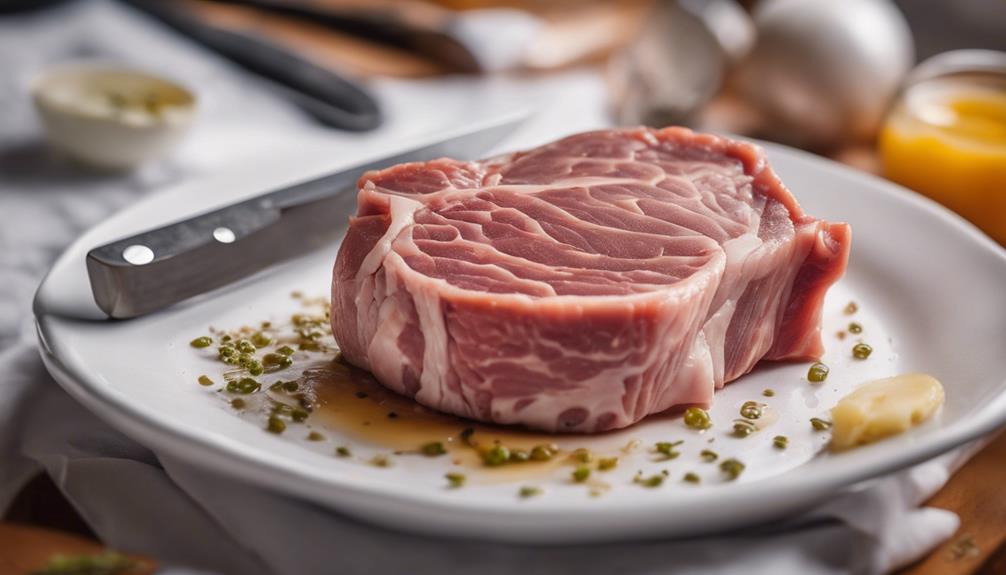
Highlighting the risks posed by endoparasites such as tapeworms is essential in understanding the potential dangers of consuming raw meat for pets. Tapeworms are common in raw meat and can infect pets when they consume contaminated food. These parasites can lead to tapeworm infestations in pets when they ingest tapeworm eggs or larvae present in raw meat. Symptoms of tapeworm infections in pets include weight loss, vomiting, diarrhea, and general discomfort. Ignoring raw food warnings increases the likelihood of pets contracting tapeworms and suffering from related health issues. To better visualize the impact of tapeworms on pets, consider the following table:
| Endoparasite | Transmission | Symptoms |
|---|---|---|
| Tapeworms | Ingestion of eggs | Weight loss |
| or larvae from raw | Vomiting | |
| meat | Diarrhea | |
| Discomfort |
Importance of Food Safety and Hygiene
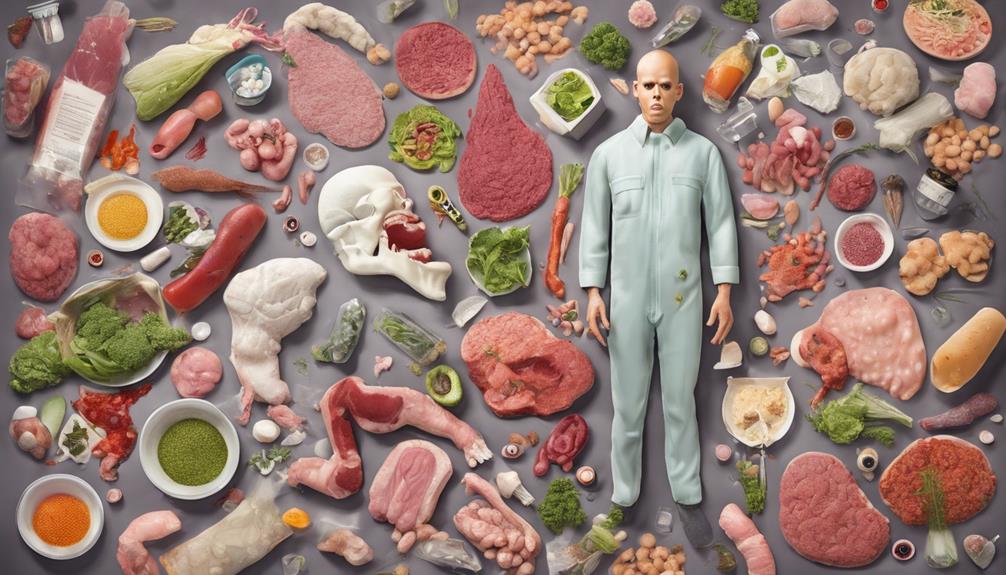
Maintaining proper food safety practices and hygiene is paramount in preventing foodborne illnesses caused by raw meat.
Cross-contamination and the spread of harmful bacteria can be avoided through simple measures like washing hands and surfaces thoroughly.
Understanding and implementing these practices are key in safeguarding against the risks associated with handling raw food.
Safe Food Handling
Implementing proper food handling techniques is essential for ensuring the safety of both pets and humans when dealing with raw pet food.
- Wash hands thoroughly with soap and water before and after handling raw pet food to prevent the spread of harmful bacteria.
- Use separate cutting boards and utensils for raw pet food to avoid cross-contamination with ready-to-eat foods.
- Clean and sanitize all surfaces that come in contact with raw pet food to reduce the risk of foodborne illnesses.
- Store raw pet food in sealed containers in the refrigerator to maintain freshness and prevent bacteria growth.
Preventing Foodborne Illnesses
Proper food safety practices are essential in preventing foodborne illnesses caused by raw pet food. Ensuring hygiene in handling raw meat is critical to avoid cross-contamination and bacterial spread. Cleaning kitchen utensils thoroughly after contact with raw food helps prevent contamination and potential illness. Neglecting these precautions can lead to serious health risks, including Salmonella, E. coli, and Listeria infections. It is essential to understand that children and individuals with weakened immune systems are particularly susceptible to the dangers of consuming raw foods. By following recommended guidelines and heeding raw food warnings, we can significantly reduce the risk of foodborne illnesses and promote the well-being of both pets and humans.
| Food Safety Practices | Importance |
|---|---|
| Proper hygiene | Prevents contamination |
| Thorough utensil cleaning | Reduces bacterial spread |
| Cross-contamination awareness | Minimizes health risks |
| Following guidelines | Ensures food safety |
| Heeding raw food warnings | Protects against illnesses |
Frequently Asked Questions
What Might Be the Danger in Eating Raw Foods?
Eating raw foods can pose serious health risks due to bacterial contamination like Salmonella and E. coli. Illness, hospitalizations, and outbreaks linked to raw diets highlight the dangers. Proper handling and cooking are essential for safety.
What Are the Risk Factors in Raw Food Contamination?
When handling raw food, risks lurk in invisible corners. Cross-contamination dances dangerously between pets and people, fueled by bacteria like Salmonella and E. coli. Vigilance is my shield against these unseen foes.
What Are the Consequences of Eating Raw?
Eating raw food can lead to serious bacterial infections like Salmonella, E. coli, and Listeria, causing food poisoning. It's important to handle raw foods safely to avoid health risks. Proper precautions are necessary.
What Are the Dangers of Eating Uncooked?
Eating uncooked foods is like dancing with danger; hidden bacteria wait to strike. Raw meats can bring a party of pathogens leading to serious illness. I dodge these risks by always cooking my meals thoroughly.
Are Raw Food Warnings Specifically Targeted Towards Raw Cookie Dough Consumption?
Raw food warnings are directed towards the causes of raw cookie dough illness. Consuming uncooked cookie dough can lead to foodborne illnesses due to the presence of raw eggs and flour, which may contain harmful bacteria like salmonella and E. coli. It is advised to avoid consuming raw cookie dough to prevent food poisoning.
Conclusion
To wrap up, disregarding raw food warnings can lead to serious health risks. Did you know that according to the CDC, foodborne illnesses from consuming raw or undercooked meat cause an estimated 48 million illnesses each year in the United States alone?
It's important to prioritize food safety and hygiene to protect yourself from the dangers associated with raw diets. Stay informed and make smart choices for your health.

